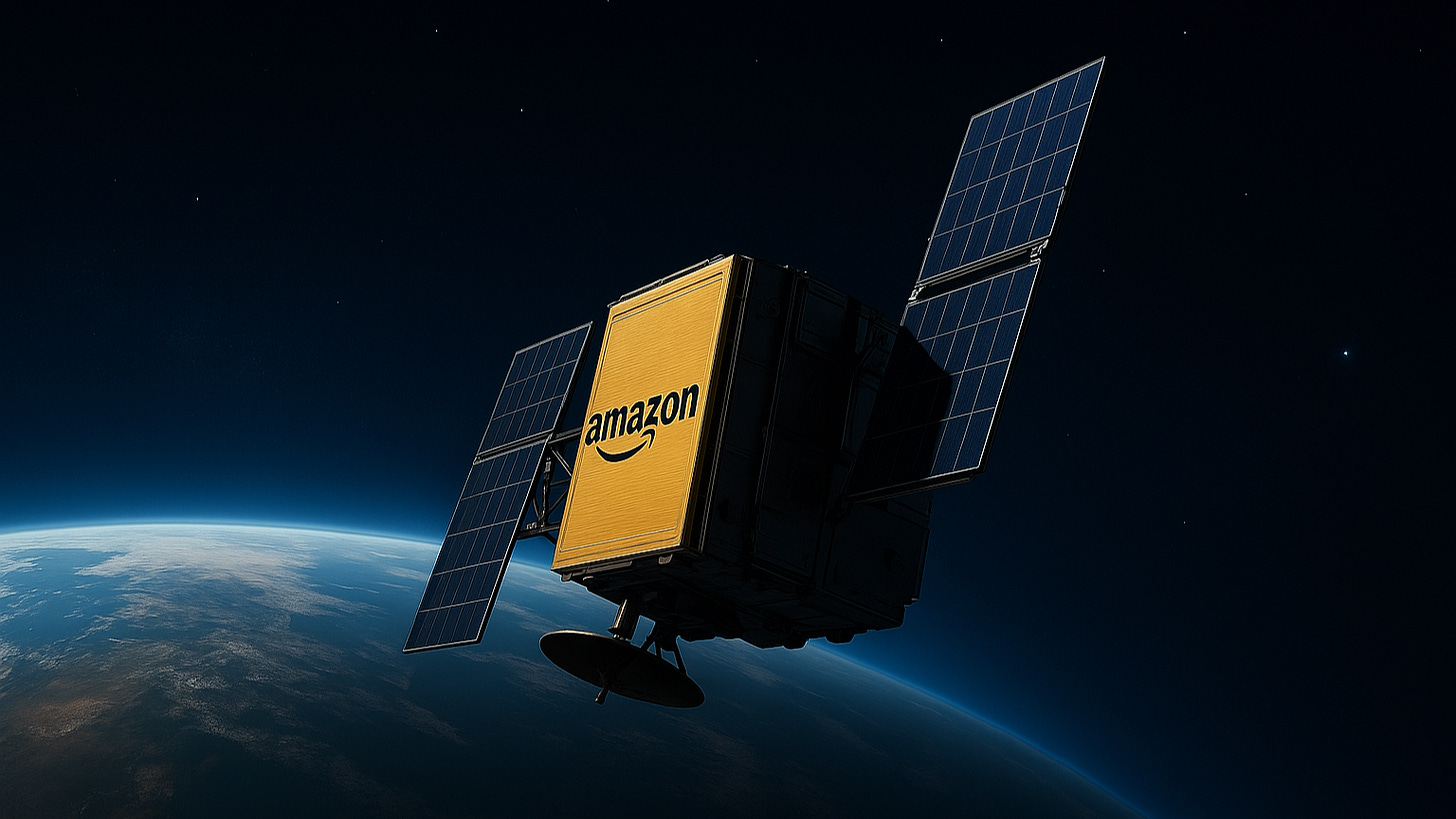📰 Amazon shoots into space: Can Project Kuiper catch up with SpaceX?
Amazon has launched its first batch of internet satellites to compete with Starlink, but the big question is if it is already too late to make a real difference in this rapidly moving market?
This week, Amazon AMZN 0.00%↑ took a big step forward in its ambitious plans to offer global internet service from space by successfully launching the first 27 satellites of its Project Kuiper. The satellites lifted off Monday evening atop an Atlas V rocket from Cape Canaveral in Florida. The launch marks a significant milestone, yet serious doubts remain if Amazon is still in time to play a major role in a market already dominated by Elon Musk’s SpaceX with its Starlink network.
Connecting the world from low-Earth orbit
Project Kuiper is working to create a network of more than 3,200 satellites in low-Earth orbit, designed to deliver fast and accessible internet across even the most isolated parts of the world. With millions of people still offline, and digital access becoming fundamental to modern life, it's no surprise that tech giants are racing to capture this massive opportunity.
Yet while Amazon is only now starting to get its first operational satellites into space, SpaceX has already launched over 8,000 Starlink satellites, with around 7,000 still actively orbiting Earth. Starlink is already connecting millions of users — from farmers in remote fields to airplanes crossing oceans, and even astronauts. That makes it incredibly challenging for Amazon to break into the market, especially since building a global satellite network isn't just expensive, with estimates of over $17 billion, but also requires years of steady progress to meet user expectations.
And that's not even mentioning the technical challenges. Satellites traveling at more than 17,000 miles per hour must constantly connect with thousands of ground stations and millions of small satellite dishes on rooftops and in fields across the world. One small mistake could cause a customer to lose their connection, something that's simply not acceptable in today’s always-online world.
The geopolitical race for space internet
Competition isn’t the only factor. Politics also plays a part. Starlink has become very important in recent conflicts, such as in Ukraine, where it kept communications going when regular networks failed. Some governments and organizations want another option besides Musk's growing influence, and Amazon, led by Jeff Bezos, could be that option.
But Amazon isn’t the only one. Other companies are also moving into satellite internet:
OneWeb: A European company focused on broadband connections from low-Earth orbit.
Telesat: A Canadian company building its Lightspeed network for businesses.
AST SpaceMobile: A U.S. company developing the first space-based mobile network that can connect directly to normal smartphones.
The European Union: Creating its own satellite internet system to have more control over communications.
China: Building large satellite networks as part of its plans for space.
The competition is growing quickly. Many countries want systems they can manage themselves, instead of depending on a few billionaires for critical communication services.
The clock is ticking…
The good news for Amazon is that demand for fast, stable internet keeps growing around the world. Project Kuiper has already signed deals with major telecom companies like Verizon, Vodafone, and NTT Docomo to help expand their mobile networks. Even groups like NASA, the U.S. Department of Defense, and DARPA have shown interest in what Kuiper can offer.
Still, Amazon is under pressure. If Kuiper takes too long to launch at scale, SpaceX could pull even further ahead, and that gap might become too large to close. Some experts think there’s enough room for more than one provider, but others worry that Amazon’s massive investment might not pay off.
One thing is clear: the new space race isn't about planting flags on the Moon anymore, it’s about who controls the internet highways of the future. It remains to be seen if Amazon can still become a serious competitor or if SpaceX will continue to dominate, but the outcome could shape the digital future of the entire planet.
Source: Amazon Website, CNN, Yahoo Finance
Disclaimer:
The information and opinions provided in this article are for informational and educational purposes only and should not be considered as investment advice or a recommendation to buy, sell, or hold any financial product, security, or asset. The Future Investors does not provide personalized investment advice and is not a licensed financial advisor. Always do your own research before making any investment decisions and consult with a qualified financial professional before making any investment decisions. Please consult the general disclaimer for more details.



